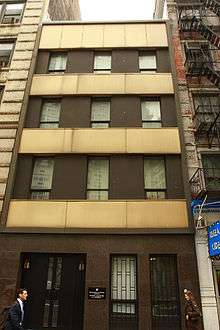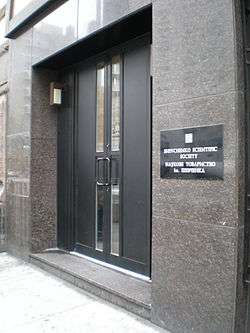Shevchenko Scientific Society
The Shevchenko Scientific Society (Ukrainian: Наукове товариство імені Шевченка, romanized: Naukóve tovarýstvo imeni Shevchénka) is a Ukrainian scientific society devoted to the promotion of scholarly research and publication that was founded in 1873.
| Formation | 1873 |
|---|---|
| Headquarters | Lviv, Ukraine |
Chairman | Roman Kushnir |
| Website | Official website |


Unlike the government-funded National Academy of Sciences of Ukraine, the society is a public organization. It was reestablished in Ukraine in 1989 during fall of the Soviet Union. Being exiled back in 1940 it now has its branches in several countries around the globe the United States, Canada, Australia, France.
The organization is named after famous Ukrainian poet, writer, artist, public and political figure Taras Shevchenko.
History
It was founded in 1873 in Lemberg (today Lviv), at that time the capital of the Austrian crown land of Kingdom of Galicia and Lodomeria, as a literary society devoted to the promotion of Ukrainian language literature initially under the name Shevchenko Society. It was established soon after another cultural society better known as Prosvita (Enlightenment). At that time any publication in Ukrainian language was prohibited in the Russian-controlled Ukraine (Little Russia), from the beginning it attracted the financial and intellectual support of writers and patrons of Ukrainian background from the Russian Empire. The Shevchenko Scientific Society was created on an idea of a writer Oleksandr Konyskyi and the Shevchenko's contemporary Dmytro Pylchykov with a financial support of Yelyzaveta Myloradovych-Skoropadska.[1]
In 1893, due to the change in its statute the Shevchenko Scientific Society was transformed into a real scholarly multidisciplinary academy of sciences with its periodical the Zapysky NTSh (Notes of the Shevchenko Scientific Society), yet continue to be specialized in the Ukrainian Studies. Throughout most of its history it had three sections: history-philosophical, philological, and mathematically-medical-natural scientific. Under the presidency of the historian, Mykhailo Hrushevsky, it greatly expanded its activities, contributing to both the humanities and the physical sciences, law and medicine, but most specifically once again it concentrated on Ukrainian studies. During this period, one of its most prolific contributors was the poet, folklorist, and literary historian Ivan Franko who headed the philological section. Also during that period the society created several museums, libraries, and archives. By 1914, several hundred volumes of scholarly research and notices had been published by the society including over a hundred volumes of its Zapysky.
The First World War interrupted the society's activities, particularly during the Russian occupation in 1914-1915 when the society's collection of works and its print shop were destroyed. After the war and the Polish-Ukrainian conflict, the West Ukraine belonged to Poland. During that time the society lost its government subsidies, but managed to carry on a precarious existence. Its major contributors were the literary historians, Vasyl Shchurat, Kyryl Studynsky, and the historian Ivan Krypiakevych. One of the most important projects of the society was the publication of the first general alphabetic encyclopedia in the Ukrainian language.
The Soviet Union annexed the eastern part of the Second Polish Republic including the city of Lviv, which capitulated to the Red Army on 22 September 1939. Upon their occupation of Lviv, the Soviets dissolved the society. Many of its members were arrested and either imprisoned or executed. Among the perished members were such academicians as R. Zubyk, a former Ukrainian minister I. Feshchenko-Chopivsky, a Ukrainian parliamentarian Petro Franko, Kyryl Studynsky, and many others. During the Nazi occupation, the society still was not able to function openly. In 1947, on the initiative of the geographer, Volodymyr Kubiyovych, it was re-founded as an émigré scholarly society in Munich; the Society's European center was later moved to Paris. Other branches were also founded in New York City (1947), Toronto (1949) and Australia (1950), and throughout the Cold War it functioned as a federation of semi-independent societies.
During its period in emigration, the major project of the society was again an encyclopedia. Under the editorship of Volodymyr Kubiyovych, it published the great Entsyklopediia ukrainoznavstva (Encyclopedia of Ukrainian Studies) consisting of four major series: the Ukrainian-language thematic encyclopedia in three volumes, the Ukrainian-language alphabetic encyclopedia in 11 volumes, the English-language thematic encyclopedia in two volumes, and the English-language alphabetic one in five volumes. The last compilation, published in Canada under the title Encyclopedia of Ukraine, is available on-line.
In 1989, the society was reactivated in the Ukrainian homeland (in Lviv) and once again undertook a large-scale research and publication program. Branches were soon founded in other Ukrainian cities and membership exceeded a thousand, including 125 full voting members.
Presidents
Ukraine
- 1873–1885 Kornylo Sushkevych
- 1885–1887 Sydir Hromnytsky
- 1887–1889 Demian Hladylovych
- 1889–1891 Sydir Hromnytsky
- 1891–1892 Demian Hladylovych
- 1892–1893 Yulian Tselevych
- 1893–1897 Oleksander Barvinsky
- 1897–1913 Mykhailo Hrushevsky
- 1913–1918 Stepan Tomashivsky
- 1919–1923 Vasyl Shchurat
- 1923–1932 Kyrylo Studynsky
- 1932–1935 Volodymyr Levytsky
- 1935–1940 Ivan Rakovsky
- 1940–1989 Soviet occupation and World War II
- 1989–2005 Oleh Romaniv
- 2005–2014 Oleh Kupchynsky
- 2014– Roman Kushnir
Europe
- ????–1952 Zenon Kuzela
- 1952–1985 Volodymyr Kubiyovych
- 1985–1997 Arkadiy Zhukovsky
- 1997–1999 Danylo Husar-Struk
- 2000–2011 Arkadiy Zhukovsky
- 2011– Stefan Dunikovsky
United States
- 1947–1952 Mykola Chubaty
- 1952–1969 Roman Smal-Stocki
- 1969–1974 Matthew Stachiw
- 1974–1977 Osyp Andrushkiv
- 1977–1990 Jaroslaw Padoch
- 1990–2000 Leonid Rudnytzky
- 2000–2006 Larysa Zaleska Onyshkevych
- 2006–2012 Orest Popovych
- 2012–2018 George G. Grabowicz
- 2018– Halyna Hryn
Canada
- 1949–1973 Yevhen Vertyporokh
- 1974–1994 Bohdan Stebelsky
- 1994–2000 Vladimir Mackiw
- 2000– Daria Darevych
Society press media
Literaturno-naukovy visnyk (English: Literary-scientific herald) was published 1898-1906, 1922-1932 in Lviv and 1907–1914, 1917-1919 in Kiev. The chief editor was Ivan Franko, since 1905 - Mykhailo Hrushevsky.
References
Notes
- Appeal of the Shevchenko Scientific Society Office in America to Head of Ukrainian Committee of Shevchenko National Prize academician Borys Oliynyk (Звернення Управи Наукового Товариства ім. Шевченка в Америці до Голови комітету Національної премії України ім. Т. Г. Шевченка академіка Бориса Олійника). Shevchenko Scientific Society website. 11 January 2016
External links
| Wikimedia Commons has media related to Shevchenko Scientific Society. |
- Shevchenko Scientific Society in Encyclopedia of Ukrainian Diaspora(Ukrainian)
- Literary Scientific Herald at Encyclopedia of Ukraine (in English)
- Shevchenko Scientific Society at Encyclopedia of Ukraine
- Shevchenko Scientific Society (in Ukrainian)
- Shevchenko Scientific Society (English)